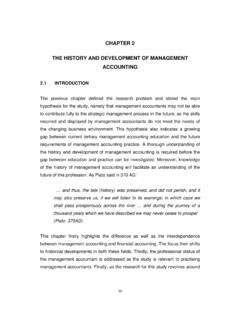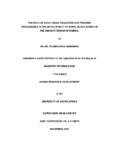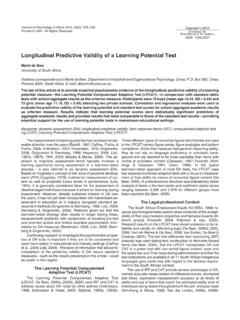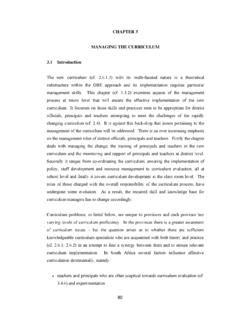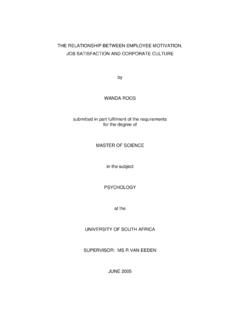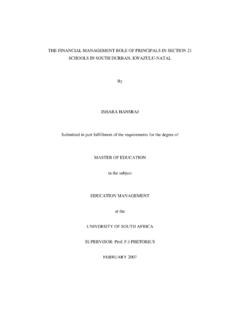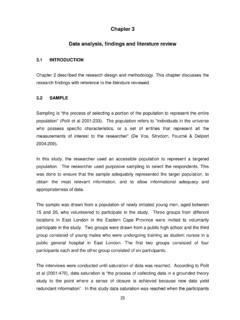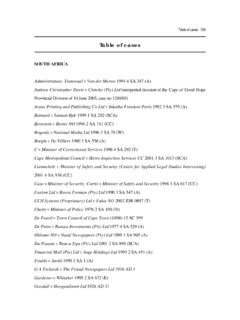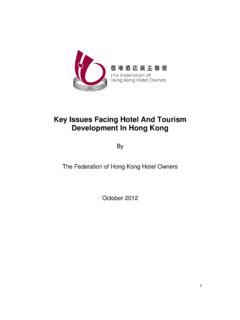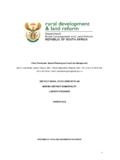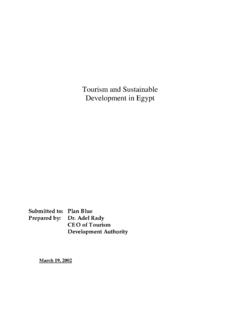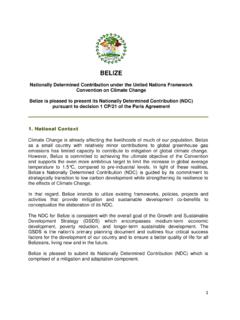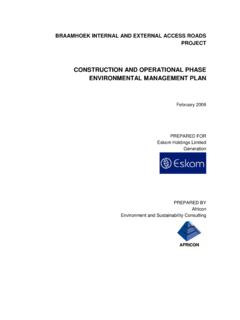Transcription of THE SIGNIFICANCE OF RURAL AREAS IN SOUTH AFRICA FOR ...
1 THE SIGNIFICANCE OF RURAL AREAS IN SOUTH AFRICA FOR tourism development THROUGH COMMUNITY PARTICIPATION WITH SPECIAL REFERENCE TO UMGABABA, A RURAL AREA LOCATED IN THE PROVINCE OF KWAZULU-NATAL by MOHAN GOPAUL Submitted in fulfillment of the requirements for the degree of MASTER OF ARTS in the subject GEOGRAPHY at the UNIVERSITY OF SOUTH AFRICA SUPERVISOR: DR. HARMSE November 2006 iiStudent number: 675-933-5 I declare that, The SIGNIFICANCE of RURAL AREAS in SOUTH AFRICA for tourism development through community participation with special reference to Umgababa, a RURAL area located in the province of KwaZulu-Natal is my own work and that all the sources that I have used or quoted have been indicated and acknowledged by means of complete references.
2 SIGNATURE DATE (MR. M. GOPAUL) iii ACKNOWLEDGEMENTS I would like to express my sincere gratitude to the following people whose contributions and support have been invaluable: Dr. Harmse, my supervisor for her superb supervision of the thesis. Ms. Melanie Nicolau, Head of Department, Department of Geography, Unisa, for her mediation in times of problems and continued assistance until completion of the thesis. Ms. Leanne Brown, subject librarian at Unisa, for her prompt service. Ms. Helenne Steenkamp, secretary at the Department of Geography, Unisa, for her prompt service with regards to communication.
3 Ms. Noeline McNamara, from eThekwini Municipality, SOUTH Local Council, assisting with some of the maps. Radhika Gopaul (my wife) for typing and layout of the thesis. Arusha and Kerina (my daughters) for their continued support and patience during the writing process. Suren Bisseru, Simunye Printers, for binding this thesis. ivTABLE OF CONTENTS LIST OF FIGURES vii LIST OF TABLES viii ABSTRACT ix CHAPTER 1.
4 BACKGROUND AND INTRODUCTION Introduction 1 Statement of problem 2 Motivation for the research 3 Objectives of the study 5 Literature study: tourism and RURAL development 5 RURAL development 6 RURAL tourism 7 Traditional and cultural 9 Community based tourism 10 tourism development in KwaZulu-Natal 11 Research design 12
5 Study area 14 Methodology 16 Organisation of the thesis 18 Problems experienced during the research 18 CHAPTER 2: tourism , EMPOWERMENT AND COMMUNITY PARTICIPATION IN RURAL development Introduction 20 RURAL development 20 Geography and tourism 23 Concepts in tourism development 24 RURAL tourism development 25 Local economic development (LED) 29 tourism and regional economic development 33 Eco- tourism (ecological tourism )
6 35 Tradition and culture 39 tourism , empowerment and community participation in development 42 Role of communities in tourism development 50 tourism development in SOUTH AFRICA 52 Pro-poor tourism 54 RURAL tourism projects 62 RURAL tourism development in KwaZulu-Natal 68 Potential for RURAL development 69 Women in RURAL development 72 Conclusion 75 CHAPTER 3 DATA GATHERING Introduction
7 77 The study area 77 Data gathering 82 Questionnaires 83 Sampling and sampling methods 88 Conclusion 90 viCHAPTER 4 ANALYSIS AND INTERPRETATION Introduction 91 Data analysis 92 Analyses and interpretation of results 96 Socio-economic characteristics 96 Willingness to participate in a tourism venture 103 Communicating their knowledge and experience 105 Conclusion 108 CHAPTER 5 SYNTHESIS AND RECOMMENDATION Introduction 110 Research objectives 110 Socio-economic conditions 110 Natural and human resources 113 Willingness to participate in a tourism venture 115
8 Communicating their knowledge and experience 117 Recommendations 118 Conclusion 120 BIBLIOGRAPHY 122 ANNEXURE A 131 viiLIST OF FIGURES Figure : The main processes involved in the research 13 Figure : Umgababa located amongst the tourist towns of the SOUTH coast of 15 KwaZulu-Natal Figure tourism model on communal empowerment 35 Figure : Community Based tourism (CBT): A conceptual framework 46 Figure : A simplified sketch of the study area in relation to KwaZulu-Natal 79 Figure : Karridene Hotel 79 Figure : Respondents earnings 98 Figure : Percentage of willing and non-willing respondents 104 viiiLIST OF TABLES Table: SOUTH AFRICA .
9 Population distributions by race (2001) 21 Table : Typology of participation 49 Table : Numerical data derived from responses obtained from questionnaire with n value of 40 94 Table : Numerical data converted to percentages with an n value of 100 % 95 Table : Level of response in terms of willingness to participate in tourism 104 ixABSTRACT The aim of this study was to determine the role of tourism , empowerment and participation in the socio-economic upliftment of the community of Umgababa. The research examines the views of the community on their socio-economic conditions, their willingness to participate in tourism business ventures and their perceptions and attitude towards communicating with other RURAL communities on tourism development .
10 The study concludes that the socio-economic living conditions of the community of Umgababa are very poor and that empowerment and participation of the community in tourism could be an answer to their problems. Given the opportunity, the majority of the people were willing to participate in a tourism business venture. Investigation revealed that there is an abundance of natural and human resources in Umgababa to start a tourism business. The community also felt that by communicating their knowledge and experience they would be able to help other communities in their own development . CHAPTER 1 BACKGROUND AND INTRODUCTION Introduction SOUTH African RURAL societies remain some of the most impoverished societies in the world, and access to employment, education, land, housing, health services and other essential resources still divide them from their urban neighbours.
